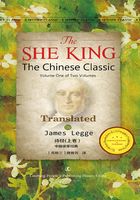
YEN-YEN
1 The swallows go flying about
With their wings unevenly displayed.
The lady was returning [to her native state],
And I escorted her far into the country.

Choo's view seems the preferable:—'Like a green robe with yellow lining, &c, so is the state of things with us.' L1.3.4 describe Chwang Këang's feelings. 已=止, 'to stop'; 亡 is equivalent to 忘, 'to forget', 'to be forgotten'.
St. 3. The green garment was originally so much silk on which the colour had been superinduced by dyeing;—intimating how the marquis had put the concubine in the place of the wife. 女=汝, 'you',referring to the marquis or husband. So, Choo;—better than K'ang-shing, who takes 女=女人. 治 has the meaning of 'to do', 'to bring about'. The 'ancients'are wives of some former time, who had been placed in similarly painful circumstances, and set a good example of conduct in them. K'ang-shing makes them out to be simply the ancient authors of the rules of propriety, with whom Chwang Këang was in accord,while the marquis had turned those rules upside down. 訧=尤, 'extraordinary', 'to go beyond what is right'.
St.4. 綌,—see on i. II. 2. 'Linen' in the translation is not quite accurate, as this cloth was made of dolichos fibre. 淒, is the rec. text; but we should read 凄,meaning 'cold'; 淒 denotes 'the app. of clouds rising'.See K'ang-shing, as quoted by Yen Ts'an in loc. It is not easy to construe the 2nd line. Wang T'aou would take both 其 and 以 as particles; but we might give it literally:—'cold is it because of the wind'. The speaker represents herself as wearing a cold dress in cold weather, when she should be warmly clad. All things are against her. 實 (=是) 獲我心, 'and get my mind'; meaning apparently, that, by her study of the examples of antiquity, Chwang Këang, found herself strengthened to endure, as she was doing, her own painful experience.
The rhymes are—in st. 1, 裏, 已, cat. 1, t. 2: in 2, 裳,亡, cat. 10: in 3, 絲, 治, 訧*, cat. 1, t. 1: in 4, 風*,心,cat. 1, t.1.
Ode 3. Narrative and allusive. CHWANG KEANG RELATES HER GRIEF AT THE DEPARTURE OF TAE KWEI, AND CELEBRATES THAT LADY'S VIRTUE. It has been related on the last ode, how Tae Kwei bore Hwan to duke Chwang of Wei; and how he was brought up by Chwang Këang and finally succeeded to his father.

I looked till I could no longer see her,
And my tears fell down like rain.
2 The swallows go flying about
Now up, now down.
The lady was returning [to her native state],
And far did I accompany her.
I looked till I could no longer see her,
And long I stood and wept.
3 The swallows go flying about
From below, from above, comes their twittering.
The lady was returning [to her native state],
And far did I escort her to the south.
I looked till I could no longer see her,
And great was the grief of my heart.

In B.C.718, he—duke Hwan, 桓公—was murdered by his half brother Chow-yu, and his mother then returned—was obliged, probably, to return—to her native State of Ch'in. Chwang Këang continued in Wei, the marchioness-dowager: and she is understood to bewail, in this piece, her sorrow at the departure of her cherished and virtuous companion.
St. 1, 2, 3. L1. 1, 2. 燕 is still the common name in China for the swallow. Maou and Choo take the reduplication of the character here as still singular;—after the Urh-ya. It seems more natural, however, to take it as plural. So, Yen Ts'an, and others. The figure of the creature in illustrations of the She is that of the Hirundo daurieus. Synonyms of 燕 are 鳦 and 玄鳥.差 (read as in i. I.) 池= 'the app. of being uneven'. To the spectator, the wings of the swallow, in its rapid and irregular flight, often present this appearance.頡頏 (al.,with 羽 on the right) denote the app. of the birds in flying, their darting upwards being specially signifie by the former character, and their sudden turns downwards by the latter. So says Maou, 飛而上曰頡,飛而下曰頏. Wang T'aou, however, calls attention to an argument of Twan Yuh-tsae, that 上 and 下 should here change places. '頡', he says, 'takes its meaning from 頁,=頭, "the head", and 頏 its meaning from 亢=頸, "the neck". When a bird is flying downwards,we see its head; when it is rising in the air, we see its neck. And moreover, that it is the downward flight which is first described appears from the下上 of the next stanza.' It is not worth while to try and settle the point. The migratory habits of the swallow, probably,lie at the basis of the allusion. Chwang Këang and Tae Kwei had been happy together as two swallows, and now one of them was off to the south, and the other was left alone.
L1. 3,4 歸 is here 'the great return (大歸)'; not the visit of a wife to see her parents, but her return for good to her native State. 之子,—子 is here 'a lady', one who was a widow in 於歸, 於將, 於 is the particle.

4 Lovingly confiding was the lady Chung
Truly deep was her feeling.
Both gentle was she and docile,
Virtuously careful of her person.
In thinking of our deceased lord,
She stimulated worthless me.


